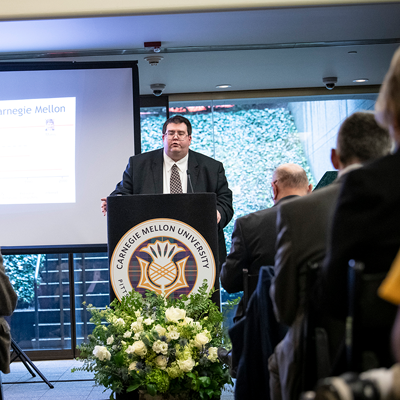
Andrew Meade McGee is the University Libraries' CLIR Postdoctoral Fellow in the History of Science and Computing. An historian by training, he specializes in the political, cultural, technology, and business history of the twentieth century United States, with a particular focus on the history of the information society.
You previously served as visiting faculty in the History Department before going to the Library of Congress. What brought you back to CMU?
Carnegie Mellon has a certain lure to someone who identifies as a computer historian. For three semesters from Fall of 2016 on, I taught technology and business history courses. While down in Washington, DC, as a Kluge Fellow at the Library the of Congress in 2018, I had the opportunity to apply to return to the CMU campus as a result of a postdoctoral fellowship in the Libraries, run through the Council on Library and Information Resources (CLIR). Dean Keith Webster had expressed interest in growing the Libraries' role in exploring and preserving the history of computing on the CMU campus. I was drawn to the position by the opportunity to work with CMU's distinctive information technology collections, particularly the Traub-McCorduck machines and the papers of such luminaries as Herbert Simon and Allen Newell.
What is HOST @ CMU?
HOST @ CMU stands for 'History of Science and Technology at Carnegie Mellon University' and is an interdisciplinary, cross-campus group of faculty and staff seeking to sponsor and promote activities that highlight historical developments in science, technology, and computing on the CMU campus. The group was formed in the summer of 2018 and has grown to include representatives from the Libraries, the History Department, the Simon Initiative, the School of Architecture, and the School of Computer Science. We're interested in emphasizing the University Libraries as a convener space for researchers from all disciplines interested in questions of how historical complexities of science and technology have shaped the present day.
Why did you identify a plaque for the site of the first computer on campus as your first major initiative?
If CMU is to continue to shape the future of the information age, it needs to look to its past for context. Members of HOST agreed that the campus community would benefit from an event reminding students and faculty of the deep history of CMU's current status as an institution driven by computer technologies. By hosting an event at Carnival commemorating the arrival of Carnegie Tech's first computer in 1956, we could both stake a claim to the University Libraries as custodian of the institution's memory and present to faculty, students, and alumni our contention that the often-overlooked historical particulars of the electronic computer's role at CMU are fascinating and relevant to understanding the campus and city of Pittsburgh in the present day.
Discuss the future of HOST and what you're excited about.
Members of HOST recently met in an extended brainstorming session to plot the group's agenda over the next few years. Within the Libraries, the group will work with librarians and the University Archives to develop a collections policy that emphasizes and grows CMU's distinctive and unique holdings related to the history of science and technology. This includes: partnering with Archives to expand collections in robotics and identify targets for oral histories; working with Special Collections to grow the Traub-McCorduck Collection of historic information processing machines; and collaborating with different departments around campus to sponsor lecture series and public events. The group is interested in formally establishing and advising a Center for the History of Science and Technology on campus that would highlight the Libraries' distinctive holdings in these areas and serve as a space for cross-campus collaborations. Many members of the group would like to see some sort of eventual University-sponsored museum promoting the history of science, technology, and computing, and view a public-oriented exhibit space as a natural extension of such a library-based center.
How can someone learn more and get involved in HOST?
Anyone interested in learning more about HOST or contributing to its efforts can contact the group through our website, or reach out to me directly (amcgee@andrew.cmu.edu). We're particularly interested in connecting CMU faculty, students, and alumni already working on projects related to history of science and technology who may not have been aware of a larger community of like-minded individuals
